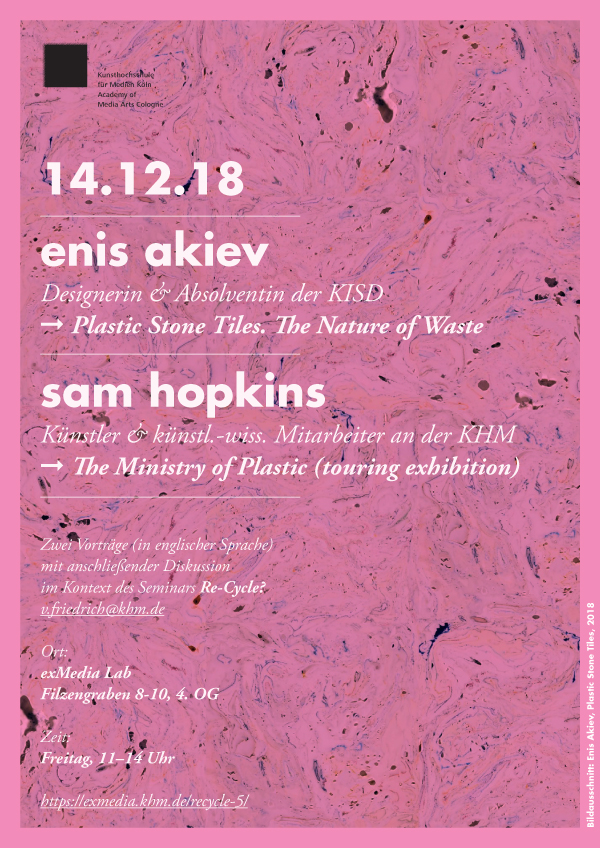
14. Dezember 2018, 11–14 Uhr
Zwei Vorträge (in englischer Sprache) mit anschließender Diskussion
im Kontext des Seminars “Re-Cycle?”
Kontakt/Ansprechpartnerin: Verena Friedrich, v [dot] friedrich [at] khm [dot] de
Ort: exMedia Lab, Filzengraben 8-10, 4. OG
Enis Akiev, Designerin & Absolventin der Köln International School of Design (KISD)
Plastic Stone Tiles. The Nature of Waste (2018)
“Plastic Stone Tiles” are tiles consisting of postconsumer plastic waste. The work originated from questions such as “What is waste?” and “Where is ‘away’?”. Waste is something subjective – what is considered waste in one place or situation can be a resource under other conditions. It is basically unused material and there is no such thing as ‘away’. The majority of plastic waste ends up in the sea. Under natural influences it forms plastiglomerate, a compound of plastic and natural geological components. It is a new kind of rock. Based on this, Akiev investigated rock forming processes and developed methods to give lightweight packaging waste a natural-looking rock-like structure. This work should give impulses to rethink the general understanding of resources and to stimulate an exploration of materials. With regard to the reduction of natural resources, we must consider waste more than ever as a resource and as a continuous step in a never-ending process, rather than the end of a product’s life.
https://cargocollective.com/enisakiev
https://www.instagram.com/enisakiev/
Sam Hopkins, Künstler & künstlerisch-wissenschaftlicher Mitarbeiter an der KHM
The Ministry of Plastic (2017–)
“The Ministry of Plastic (touring exhibition)” is an installation in a reclaimed steel shipping container that stages a future in which the finite reserves of the world have have been depleted. In this world, plastic, once a synonym for ubiquity and convenience, has become so limited to be valuable and controlled by corporate interests. “The Ministry of Plastic (touring exhibition)” is an educational exhibition designed to inculcate citizens with a sense of responsibility about how to use plastic appropriately.
More information about “The Ministry of Plastic” – Concept:
It is the future. The finite reserves of the earth have reached their limit. Oil is a thing of the past, plastic is cherished and valuable, steel is preciously scant. These finite reserves, and renewable resources are controlled and monopolised by powerful corporations. Smart devices monitor citizens and track their usage of resources. It is obligatory to re-introduce unused plastic into the system.
But not everyone cooperates willingly with this arrangement and many people resent this level of control. Citizens devise numerous tactics for secreting plastic out of the loop. A blackmarket in ancient plastic objects flourishes. This widespread dissidence is heterogenous in nature, ranging from individuals that take plastic simply as a means of asserting autonomy, to a syncretic, mystical belief-system which attributes power and magic to these relics of a former era of opulence.
“The Ministry of Plastic (touring exhibition)” displays a collection of confiscated plastic objects, together with a recruitment video for young people to go and work in the plastic harvest. Copies of the sacred text of this society, The Rubbish Companion are distributed for free, in an attempt to eliminate this antisocial practice and build model citizens.
To entice visitors in, to display the wealth of the corporate world, and to emphasise the primitive structures of the past, “The Ministry of Plastic (touring exhibition)” is located in a precious shipping container, a rare find from a recent archaeological excavation that has been stripped and polished to its steel essence.